Related Research Articles

Constance Georgine Markievicz, also known as Countess Markievicz and Madame Markievicz, was an Irish politician, revolutionary, nationalist, suffragist, socialist, and the first woman elected to the Westminster Parliament, and was elected Minister for Labour in the First Dáil, becoming the first female cabinet minister in Europe. She served as a Teachta Dála for the Dublin South constituency from 1921 to 1922 and 1923 to 1927. She was a Member of Parliament (MP) for Dublin St Patrick's from 1918 to 1922.
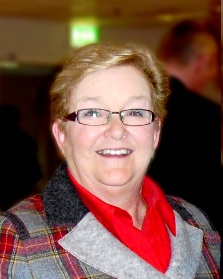
Niamh Síle Bhreathnach is a former Irish Labour Party politician who served as Minister for Education from 1993 to 1994 and 1994 to 1997. She served as a Teachta Dála (TD) for the Dún Laoghaire constituency from 1992 to 1997. She was a Senator from June 1997 to July 1997, after being nominated by the Taoiseach.
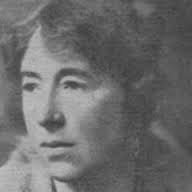
Winifred Mary Letts (1882–1972) was an English-born writer who spent most of her life in Ireland. She was known for her novels, plays and poetry.

Frenchpark, historically known as Dungar, is a village in County Roscommon, Ireland on the N5 national primary road. It was the home of Douglas Hyde, the first President of Ireland. The nearby French Park Estate was until 1952 the ancestral seat of the French family, Barons de Freyne. The estate was sold to the Irish Land Commission in the 1950s and was dismantled by the mid 1970s. A historic smokehouse is one of the few remaining legacies of this period.

RMS Leinster was an Irish ship operated by the City of Dublin Steam Packet Company. She served as the Kingstown-Holyhead mailboat until she was torpedoed and sunk by the German submarine UB-123, which was under the command of Oberleutnant zur See Robert Ramm, on 10 October 1918, while bound for Holyhead. She sank just outside Dublin Bay at a point 4 nautical miles (7.4 km) east of the Kish light.

John de Courcy Ireland was an Irish maritime historian and political activist.
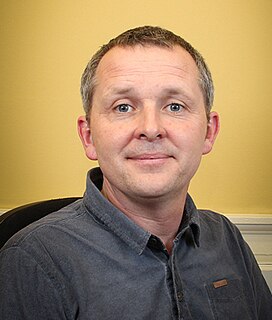
Richard Boyd Barrett is an Irish People Before Profit/Solidarity politician who has been a Teachta Dála (TD) for the Dún Laoghaire constituency since the 2011 general election. Boyd Barrett is a former member of Dún Laoghaire–Rathdown County Council. He is also chair of the Irish Anti-War Movement and has been cited on war issues in the Irish media.
The Kingstown lifeboat disaster occurred on Christmas Eve 1895 off Kingstown, Ireland, when the Kingstown lifeboat was capsized while attempting to rescue the crew of the stricken SS Palme. The crew of fifteen were lost. The event is commemorated annually at Dún Laoghaire Harbour.
Rochdale and Prince of Wales were two troop ships that sank in Dublin Bay in 1807.
Louie Bennett was an Irish suffragette, trade unionist, journalist and writer. Born and raised in Dublin, she established the Irish Women's Suffrage Federation in 1911. She was a joint editor and contributor to the Irish Citizen newspaper. She wrote two books, The Proving of Priscilla (1902) and A Prisoner of His Word (1908), and would continue to contribute to newspapers as a freelance journalist. She played a significant role in the Irish Women Workers' Union. She was the first woman president of the Irish Trade Union Congress.
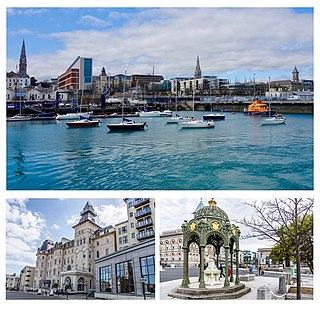
Dún Laoghaire is a suburban coastal town in the traditional county of Dublin in Ireland. It is the county town of Dún Laoghaire–Rathdown, one of the three authorities that replaced the old Dublin County Council in 1994.

The Mariners' Church is a former Church of Ireland church located in Haigh Terrace, near the centre of Dún Laoghaire town, southeast of Dublin city. It now houses the National Maritime Museum of Ireland.

Mary Mitchell O'Connor is a former Irish Fine Gael politician who served as Minister of State for Higher Education from 2017 to 2020 and Minister for Jobs, Enterprise and Innovation from 2016 to 2017. She served as a Teachta Dála (TD) for the Dún Laoghaire constituency from 2011 and 2020.
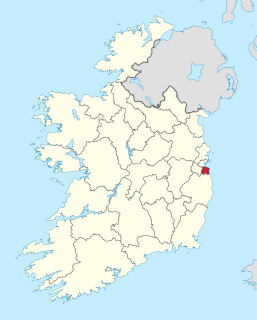
A Dún Laoghaire–Rathdown County Council election was held in Ireland on 23 May 2014 as part of that year's local elections. Forty councillors were elected from a field of 85 candidates for a five-year term of office from six local electoral areas by proportional representation with a single transferable vote.
Ethel Rhind was an Irish stained-glass and mosaic artist, who was associated with An Túr Gloine.

The Campaign for Nuclear Disarmament (CND) is an organisation that advocates unilateral nuclear disarmament by the United Kingdom, international nuclear disarmament and tighter international arms regulation through agreements such as the Nuclear Non-Proliferation Treaty. It opposes military action that may result in the use of nuclear, chemical or biological weapons and the building of nuclear power stations in the UK.
Caroline or Carrie Agnes Gray was an English hostess and owner of Freeman's Journal.

Betty Chancellor was an Irish actress.

A Dún Laoghaire–Rathdown County Council election was held in Dún Laoghaire–Rathdown in Ireland on 24 May 2019 as part of that year's local elections. Forty councillors were elected for a five-year term of office from six local electoral areas (LEAs) by single transferable vote.

Jennifer Carroll MacNeill is an Irish Fine Gael politician who has been a Teachta Dála (TD) for the Dún Laoghaire constituency since the 2020 general election. She has worked as a solicitor and barrister within the public service and also a government special advisor.
References
- 1 2 3 4 5 6 White, Lawrence William (2009). "Ireland, Beatrice de Courcy (née Haigh) ('Betty', 'Bet')". In McGuire, James; Quinn, James (eds.). Dictionary of Irish Biography. Cambridge: Cambridge University Press.
- 1 2 3 "Radical political and social campaigner". The Irish Times. 8 January 2000. Retrieved 6 January 2020.
- ↑ "Civic award for de Courcy Ireland". The Irish Times. 8 June 2002. Retrieved 6 January 2020.